Chapter 12: Ethical theories
Chapter learning objectives
Upon completion of this chapter you will be able to:
- explain and distinguish between the ethical theories of relativism and absolutism
- explain, in an accounting and governance context, Kohlberg's levels of human moral development
- describe and distinguish between deontological and teleological/consequentialist approaches to ethics
- describe and evaluate Gray, Owen & Adams' (1996) seven positions on social responsibility
- describe and evaluate other constructions of corporate and personal ethical stance
- describe and analyse the variables determining the cultural context of ethics and corporate and social responsibility (CSR).
 1 Absolutism and relativism
1 Absolutism and relativism
Relativism and absolutism both refer to the ethical and moral belief systems in society.


 Absolutism and relativism
Absolutism and relativism
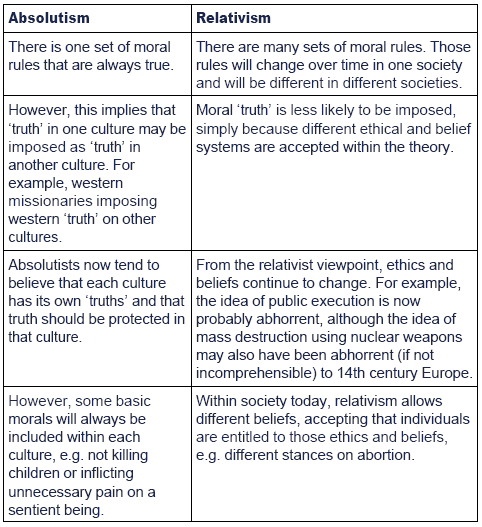
In the business context, legislation and best practice attempt toimpose a set of absolute rules on directors, auditors, etc. However,directors and auditors may still choose to interpret those rules inlight of relativism.
For example, money laundering may be seen as being 'allowed' or'correct' where no individual is harmed and the benefit is in effect areward for risk taking, even though most legislative systems determinemoney laundering to be 'wrong'.

Dogmatic versus pragmatic approach
The idea of absolutism and relativism can be illustrated with two similar concepts.
- A dogmatic approach takes the view that there is one truth and this truth is to be imposed in all situations.
- The word is taken from the Greek dogma – or given truth.
- This viewpoint corresponds to absolutism.
- A pragmatic approach attempts to find the best route through a specific moral situation without reference to any absolutist belief.
- The approach is similar to relativism in attempting to find a solution based on the given belief system of the individuals involved.
 2 Deontological and teleological approaches to ethics
2 Deontological and teleological approaches to ethics
Deontological approach
- This is a non-consequentialist theory.
- The motivation or principle is important.
- An action can only be deemed right or wrong when the morals for taking that action are known.
There are three key maxims, or tests, for any action: an action is morally 'right' if it satisfies all three.
- Consistency: Act only according to that maxim by which you can, at the same time, desire that it should become a universal law.
- The action can only be right it everyone can follow the same underlying principle.
- Human dignity: Act so that you treat humanity, whether in your own person or in that of another, always as an end and never as a means only.
- Universality: Act only so that through its maxims could regard itself at the same time as universally lawgiving.
- Would an action be viewed by others as moral or suitable ?

 Deontological approach
Deontological approach
Based on the theory of Immanuel Kant. Humans are regarded asrational actors who can decide right and wrong for themselves. Thetheory introduces the concept of the 'categorical imperative', i.e. aframework that can be applied to every moral issue. Humans thereforework within this framework.
The maxims are tests for any action. An action is morally 'right' if it survives all three tests or maxims.
The categorical imperative has three elements or maxims:

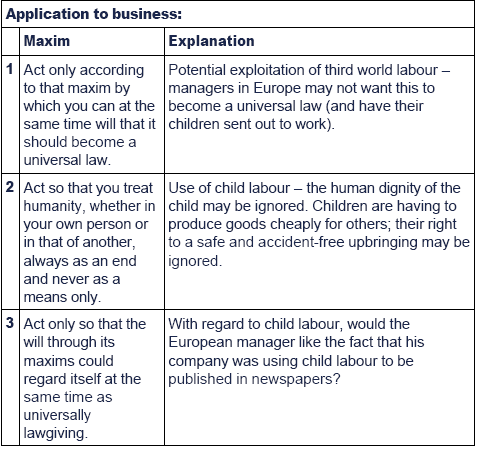

Teleological approach
- This is a consequentialist theory.
- Whether a decision is right or wrong depends on the consequences or outcomes of that decision.
- As long as the outcome is right, then the action itself is irrelevant.
There are two perspectives from which the outcome can be viewed:
- Egoism
- Sometimes thought of as the view 'what is best for me?'. An action is morally right if the decision maker freely decides in order to pursue either their short-term desires or longer-term interests.
- The egoist will also do what appears to be 'right' in society because it makes them feel better.
- Egoism does not always work because actions on all members of society cannot be determined.
- Utilitarianism
- Sometimes taught as the idea of 'what is best for the greatest number?'. An action is morally right if it results in the greatest amount of good for the greatest number of people affected by that action.
- It applies to society as a whole and not the individual.
- It is valuable in business decisions because it introduces the concept of 'utility' – or the economic value of actions.
- It is highly subjective.


 Teleological approach
Teleological approach
Teleological approach
The term derives from the Greek 'end-science' in other words thegoal is important, not the means of getting there. It is aconsequentialist theory – whether a decision is right or wrong dependson the consequences or outcomes of that decision.

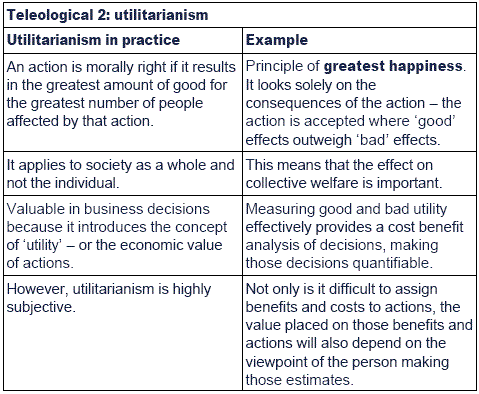


 Test your understanding 1
Test your understanding 1
Explain the teleological and deontological views of the following actions:
(a)Animal testing.
(b)Capital punishment (execution) of a serial killer.
(c)Whistleblowing.

3 Kohlberg's cognitive moral development (CMD) theory
- Kohlberg developed a cognitive moral development (CMD) theory to explain the reasoning process behind moral judgements.
- This theory is viewing ethical decisions from an individual's perspective.
Kohlberg's levels of human moral development

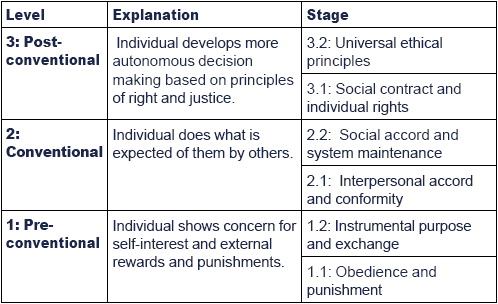
- The three main levels are shown above.
- Each level is subdivided into two stages – giving six stages in total.
- Individuals tend to move from Level 1 to Level 3 as they get older.
- Movement is decided by how a decision is made, not what the decision is about.
- Research indicates that most people, including business managers, tend to reason on Level 2.

 Cognitive moral development theories
Cognitive moral development theories
Kohlberg's theory relates to CMD, i.e. theories that attempt to explain cognitive processes and the decisions taken by individuals. Kohlberg'stheory of CMD attempts to show the reasoning processes used byindividuals, and how those processes changed as the individual maturedfrom a child to an adult.
In other words, CMD relates to the different levels of reasoning that an individual can apply to ethical issues and problems.
Kohlberg identified three levels of moral development, with two sub-stages within each level – giving six stages in total.
- Level one: The individual is focused on self-interest, external rewards and punishment
- Level two: The individual tends to do what is expected of them by others
- Level three: The individual starts to develop autonomous decision making which is based on internal perspectives of right/wrong ethics, etc. rather than based on any external influences.
As individuals move through the stages, they are moving onto higherlevels of moral reasoning – with higher levels in general termsproviding more 'ethical' methods of reasoning. Most individuals operateat Level 2 reasoning – so decisions are made in accordance with whatan individual perceives others to believe and in accordance with what istherefore expected of that individual by others.
The theory has been criticised on the following grounds:
- it has gender bias – the fieldwork for the theory was drawn from interviews with young American males
- there is too great an emphasis on rights and justice compared with other bases of morality
- people tend to use different moral reasoning strategies in different situations implying that there is no sequence of stages.


 CMD levels
CMD levels

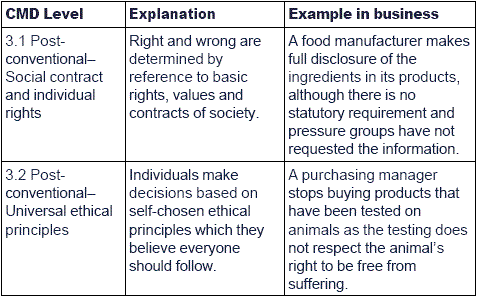
In a business context, managers are normally on Level 2.
From the corporate governance point of view – whistleblowers willbe at Level 2.2 and more likely at 3.2. Whistleblowers are likely to beadversely treated, hence they must have a strong sense of ethics totake this stance.


 Test your understanding 2
Test your understanding 2
Which level, and stage, of CMD do the following examples relate to ?
(1)A manager includes an hour's overtime on his/her timesheet because all other managers do so.
(2)A fishing company's CSR report explains howthe welfare of fish is maintained in its fish farms, although there isno statutory or other obligation to provide the information or care forthe fish.
(3)An employee does not disclose informationindicating that financial statements have omitted important liabilitiesin return for enhanced pension benefits from the company.
(4)A director does not include some importantliabilities in the financial statements because inclusion would damagethe reputation of the company.
(5)The company canteen only uses organicingredients in meals provided even though employees do not know this anddid not request the change.
(6)Employees are given vouchers to obtain free lunches in the company canteen.

 4 Seven positions on social responsibility
4 Seven positions on social responsibility
- There is a belief that organisations should have some social responsibility.
- With social responsibility there is social accountability – organisations must account for their actions.
- The belief means that there may be a difference between how the world is now and how it should be.
- Gray, Owens and Adams provide seven positions on social responsibility as alternative views on this difference.
 Refer to the Examiner's article published in Student Accountant in February 2008 “All about stakeholders – part 2â€
Refer to the Examiner's article published in Student Accountant in February 2008 “All about stakeholders – part 2â€
Pristine capitalist:
- underpinning value is shareholder wealth maximisation.
- anything that reduces shareholder wealth (such as acting in a socially responsible way) is theft from shareholders.
Expedients:
- recognise some social responsibility expenditure may be necessary to strategically position an organisation so as to maximise profits.
- this is back to the concept of 'enlightened self-interest' (discussed in chapter 7).
Proponents of social contract:
- businesses enjoy a licence to operate granted by society so long as the business acts in an appropriate way.
Social ecologist:
- recognises that a business has a social and environmental footprint and therefore bears responsibility for minimising that footprint.
Socialist:
- actions of business are those of the capitalist class oppressing other classes of people.
- business should be conducted so as to redress imbalances in society.
Radical feminist:
- society and business should be based on feminine characteristics such as equity, dialogue, compassion and fairness.
Deep ecologist:
- humans have no more intrinsic right to exist than any other species.

 Seven positions on social responsibility
Seven positions on social responsibility
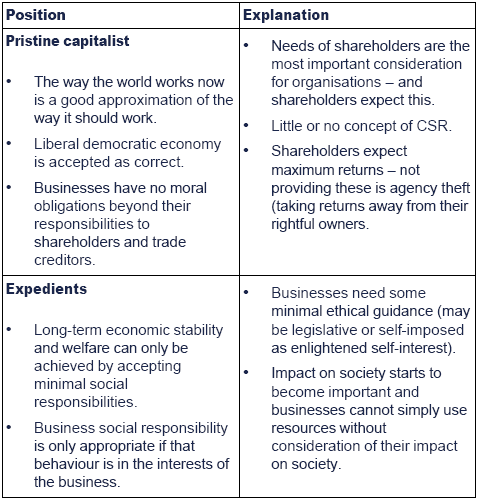
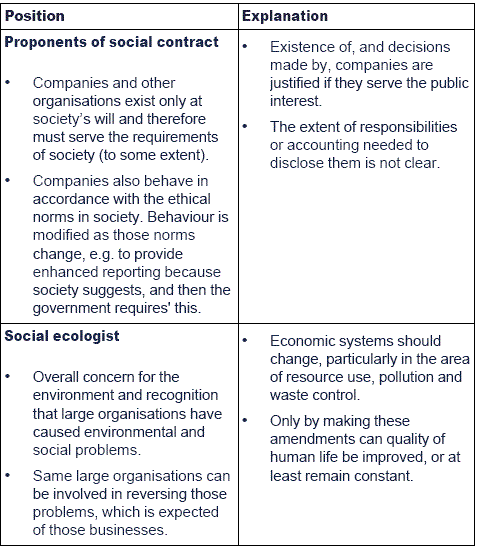
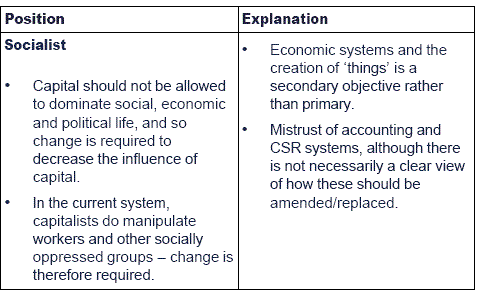



 Test your understanding 3
Test your understanding 3
A global environmental group has entered into an alliance with arefrigerator manufacturer. Its actions have led to a bitter internalbattle, with many founding members suggesting the organisation had 'soldout' to the business world. Others argued that their actions might helpsave the planet from climate change.
The company in question is FN, a German domestic and industrialrefrigerator manufacture that was in receivership, its predicamentarising from a lack of investment and chronic inefficiency as anex-eastern German communist organisation. The environmental groupintended to use this company to launch its Chlorofluorocarbon-free(CFC-free) fast-freeze unit. This revolutionary technology eliminatesthe emissions associated with refrigeration units that have been blamedfor destroying the ozone layer and raising world climate.
The environmental group actively promoted the idea amongst itsworldwide membership and, at a press conference three years ago, statedthat it had a large number of advance orders from customers willing tosign up to buy the fridges once they were in production. The receiversubsequently conceded and allowed the company to begin trading again,although confidentially he believed the idea was just an attempt by thecompany to save themselves from receivership, rather than indicatinggenuine environmental beliefs.
Required:
Discuss the ethical position of FN and the environmental group, using relevant ethical theories to illustrate as appropriate.
[Note: This scenario of FN and the environmental group will be revisited in a later chapter]

5 Variables determining cultural context
This section looks at the wider cultural context in which ethics and socially responsible behaviour exist.
The variables determining the cultural context of ethics and CSR include:
- Economic – focus on profitability.
- Legal – focus on compliance with the law.
- Ethical – focus on doing 'what is right'.
- Philanthropic – focus on doing 'what is desired'.
These were discussed in chapter 7 - Carroll's model of CSR.
Cultural differences:
- The extent of ethics and CSR varies according to culture.
- The four responsibilities have different connotations in a European context as opposed to a US context.
- The European context focuses on ethics and philanthropic actions being enforced legally, while the US system tends to focus on the discretionary actions of companies and individuals (economic factors).

 Cultural differences
Cultural differences
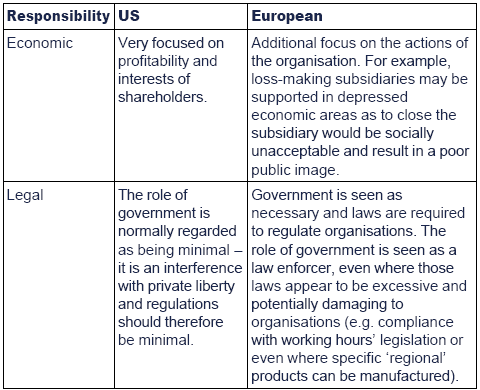
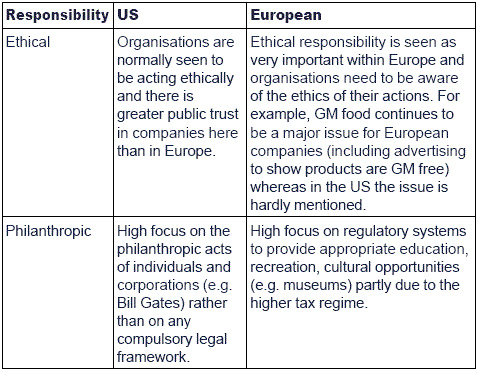

6 Corporate and personal ethical stances
Another view of corporate and personal ethical stances can be gained from considering the following four areas:
Corporate stance relates to the approach of the organisation to the different theories.
Personal stance relates to the approach of the individual to different theories.


 Analysis of theories
Analysis of theories

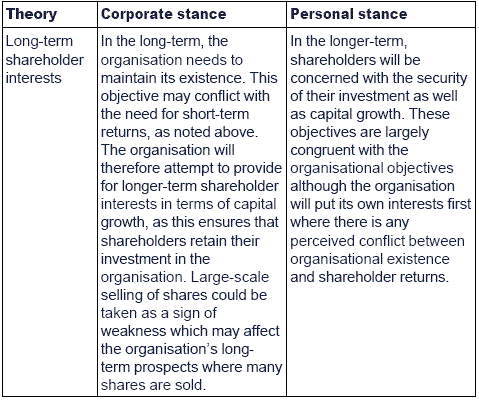

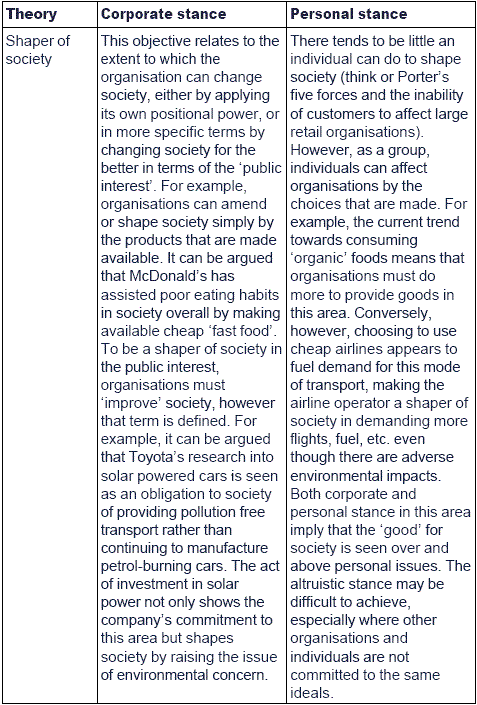

7 Chapter summary
Test your understanding answers

 Test your understanding 1
Test your understanding 1
Deontological view
(a)Unlikely to be allowed because testingdenies the right of animals to choose – their dignity is thereforeaffected (second maxim).
(b)Not allowed because killing someone cannot be a universal law (first maxim).
(c)Possibly allowed – although the thirdmaxim may prevent this. If you are known as a whistleblower you may notwant this knowledge to be made public – you may not find another job.
Teleological view
(a)Testing is acceptable because the pain suffered by the animal is allowable as it prevents far greater pain to many humans.
(b)This is justifiable as the killing this one person may prevent that person murdering many more people.
(c)Justifiable where the good to societyoutweighs the harm done, i.e. the harm of denying directors theirfreedom is outweighed by society as a whole being protected from poorproducts or illegal acts in a company.


 Test your understanding 2
Test your understanding 2
(1)2.1: Conventional – Interpersonal accord and conformity. This is what the peer group expects.
(2)3.2: Post-conventional – Universal ethicalprinciples. The rights of animals are respected based on the company'sown ethical principles.
(3)1.2: Pre-conventional – Instrumental purpose and exchange. The employee receives a 'bribe' which enhances their own interests.
(4)1.1: Pre-conventional – Obedience and punishment. The director is rewarded by keeping his/her job.
(5)3.1 Post-conventional – Social contractand individual rights. Because employees did not request the change –and it will be most expensive for the company to operate the canteenhaving made the decision.
(6)2.2: Conventional – Social accord andsystem maintenance. There is no requirement to do this – but theemployer is looking after the health of the employees.


 Test your understanding 3
Test your understanding 3
Ethical positions
The alliance between the environmental group and FN suggests commonground or similar motivations behind their joint action. This may notbe the case. The two organisations may work together for very differentreasons and their decisions may arise from differing ethicalstandpoints.
FN
The confidential comment by the receiver provides an insight intothe most obvious and possibly powerful ethical stance. Self-preservationis described in ethical theory as egoism, a consequentialist base wherethe individual asks, as a normal, accepted or normative view of humanbehaviour, “What is in it for me?â€
In this case the receiver describes the motivation as one ofavoidance of bankruptcy and job loss. Sine this would lead to realfinancial hardship for everyone in FN and since this hardship has animmediate effect on the quality of individuals lives it is not difficultto appreciate the motivational impact of this.
In an ethical sense it is entirely correct to consider oneself andone's own preservation above all others if one believes in the ethicalright of the egoist model. Others would argue that this is a selfishstandpoint and that other factors should be more prominent in thedecision making process.
Some would argue that it is the State's duty to support theorganisation and ensure the continuance of employment. The case studydescribes the nature of the company as being ex-communist and this givesan insight into this ethical viewpoint. Egalitarianism is an ethicalstance that believes the right course of action is the one that sharesthe benefit of a given venture as widely as possible among societalmembers. This is associated with communism where it is the role of theState to ensure the widest possible distribution of wealth through jobsand services such as education and wealth.
Using this ethical framework employees and management at FN maybelieve the State (and through this the representative of the State, thereceiver) has a duty to do whatever they can to ensure the continuanceof their jobs and their company.
Senior management may have used an opposing viewpoint as a basisfor deciding the morally right course of action. Assuming they had achoice as to whether to support the venture or invest their talent inother companies, they may have taken a non-egalitarian view. This is anethical stance that defines right in terms of the potential for anindividual to generate wealth for themselves.
The application of non-egalitarianism would be in the belief thatthe new venture would make profits and those profits would benefitsenior management / shareholders personally. The morally right course ofaction is the one that leads to individual rewards rather than benefitfor the common good. This is egotistic in intent, the difference betweenthe two being the scale of the terminology, egoism is personal,non-egalitarianism is a societal mindset.
Environmental group
The environmental group is split over its support for this proposedcooperation project. This may be for many reasons although the casestudy mentions that some members believe others have 'sold out' to thebusiness world. This view would relate to a belief that the ethicalframework used by those that agree to the project is one of selfgratification and reward through a major business venture. Even if thereward is not personal but ploughed back into the environmental group itwould still have been generated at the expense of global resourcesworking for a profit motive.
As described above, this profit motive would be one of egoism andnon-egalitarianism both of which are the opposite of the environmentalgroups usual ethical stance based on utilitarianism. Utilitarianismbelieves that the ethical right is determined through considering whatis right for the majority and acting accordingly. In this case themajority would be global society, both today's and future generations,and ensuring that actions today do not deplete global resources or have anegative environmental impact in terms of ozone depletion.
It could be argued that the actual decision making process used bythe environmental group is one that accepts both of these opposingviewpoints. This pluralist, pragmatic view is one that accepts thereality of the global situation and recognises that in order to do themost good the environmental group must use its resources in any way thatseems appropriate given a set of circumstances.
The ethical right may therefore derive through a post-modernistapproach where what is right is determined through examination of localissues (German company in receivership and opportunities that relate tothis). The most appropriate action also comes from understanding thatthere is no simple world view and that extreme or intransigentstandpoints are not as likely to be successful as a more adaptiveapproach to decision making. This ethical view is a fundamentaldeparture from the traditional model or absolutist view generally takenby pressure groups and, although successful in this case, may suggest acompromising ethical position that is very difficult for many members toaccept.

|
Created at 5/24/2012 12:36 PM by System Account
(GMT) Greenwich Mean Time : Dublin, Edinburgh, Lisbon, London
|
Last modified at 5/25/2012 12:54 PM by System Account
(GMT) Greenwich Mean Time : Dublin, Edinburgh, Lisbon, London
|
|
|
|
 |
Rating
:
|
 Ratings & Comments
(Click the stars to rate the page) Ratings & Comments
(Click the stars to rate the page)
|
 |
Tags:
|
|
|
|
|